中考反义疑问句知识点习题带答案
(完整)初中英语反义疑问句专项练习(附答案)
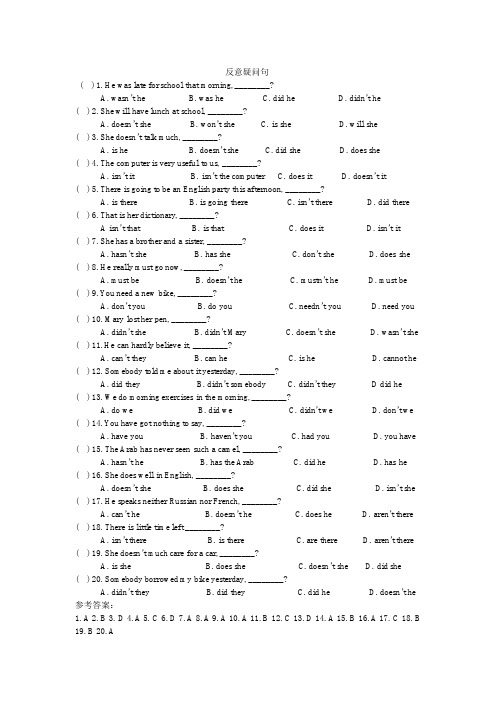
反意疑问句()1.H e w as l at e f ors choolt hatm or ni ng,________?A.w as n’theB.w as heC.di d heD.di dn’the()2.She w i l lhave l unch ats chool,________?A.does n’ts heB.w on’ts heC.i s s heD.w i l ls he()3.She does n’tt al k m uch,________?A.i s heB.does n’ts heC.di d s heD.does s he()4.The com put eri s ver y us ef ult o us,________?A.i s n’ti tB.i s n’tt he com put erC.does i tD.does n’ti t()5.Ther e i s goi ng t o be an E ngl i s h par t y t hi s af t er noon,________?A.i s t her eB.i s goi ng t her eC.i s n’tt her eD.di d t her e ()6.Thati s herdi ct i onar y,________?A i s n’tt hat B.i st hat C.does i t D.i s n’ti t ()7.She has a br ot herand a s i s t er,________?A.has n’ts heB.has s heC.don’ts heD.does s he ()8.H e r eal l y m us tgo now,________?A.m us tbeB.does n’theC.m us t n’theD.m us tbe ()9.Y ou need a new bi ke,________?A.don’tyouB.do youC.needn’tyouD.need you ()10.M ar y l os ther pen,________?A.di dn’ts heB.di dn’tM ar yC.does n’ts heD.w as n’ts he ()11.H e can har dl y bel i eve i t,________?A.can’tt heyB.can heC.i s heD.cannothe ()12.Som ebody t ol d m e abouti tyes t er day,________?A.di d t heyB.di dn’ts om ebodyC.di dn’tt hey D di d he ()13.W e do m or ni ng exer ci s es i n t he m or ni ng,________?A.do w eB.di d w eC.di dn’tw eD.don’tw e ()14.Y ou have gotnot hi ng t o s ay,________?A.have youB.haven’tyouC.had youD.you have ()15.The A r ab has nevers een s uch a cam el,________?A.has n’theB.has t he A r abC.di d heD.has he ()16.She does w el li n E ngl i s h,________?A.does n’ts heB.does s heC.di d s heD.i s n’ts he ()17.H e s peaks nei t her R us si an norFr ench,________?A.can’theB.does n’theC.does heD.ar en’tt her e ()18.Ther e i s l i t t l e t i m e l ef t________?A.i s n’tt her eB.i s t her eC.ar e t her eD.ar en’tt her e ()19.She does n’tm uch car e f ora car,________?A.i s s heB.does s heC.does n’ts heD.di d s he ()20.Som ebody bor r ow ed m y bi ke yes t er day,________?A.di dn’tt heyB.di d t heyC.di d heD.does n’the 参考答案:1.A2.B3.D4.A5.C6.D7.A8.A9.A10.A11.B12.C13.D14.A15.B16.A17.C18.B 19.B20.A。
反义疑问句练习题目及答案
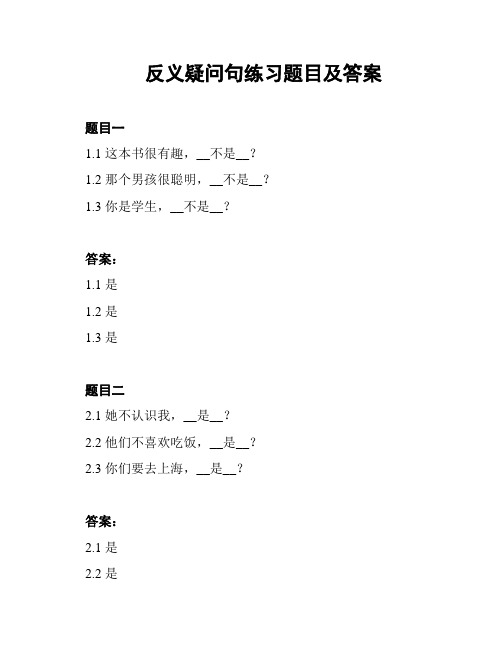
反义疑问句练习题目及答案题目一1.1 这本书很有趣,__不是__?1.2 那个男孩很聪明,__不是__?1.3 你是学生,__不是__?答案:1.1 是1.2 是1.3 是题目二2.1 她不认识我,__是__?2.2 他们不喜欢吃饭,__是__?2.3 你们要去上海,__是__?答案:2.1 是2.2 是2.3 是题目三3.1 他不喜欢看电视,__是__?3.2 你不觉得这个问题很有意思,__是__?3.3 她没去过北京,__是__?答案:3.1 是3.2 是3.3 是题目四4.1 他们不会唱歌,__是__?4.2 这是个好主意,__不是__?4.3 他喜欢看电影,__不是__?答案:4.1 是4.2 不是4.3 不是题目五5.1 她不懂汉语,__是__?5.2 你会游泳,__是__?5.3 他们喜欢吃饭,__是__?答案:5.1 是5.2 是5.3 是题目六6.1 这不是你的手机,__是__?6.2 你不喜欢这个颜色,__是__?6.3 他们会来参加聚会,__是__?答案:6.1 是6.2 是6.3 是题目七7.1 他没有听说过这个地方,__是__?7.2 你不想去旅行,__是__?7.3 她知道这个答案,__是__?答案:7.1 是7.2 是7.3 是题目八8.1 我今天晚上有时间,__不是__?8.2 他没有考试,__是__?8.3 你们都明白这个问题,__是__?答案:8.1 不是8.2 是8.3 是。
初中反义疑问句详解及练习和答案

初中反义疑问句详解及练习和答案反义疑问句即附加疑问句。
它表示提问人的看法,没有把握,需要对方证实。
它表示提问人的看法,没有把握,需要对方证实。
反义疑问句由两部分组成:前一部分是一个陈述句,后一部分是一个简短的疑问句,两部分的人称时态应保持一致。
1.陈述部分肯定式+ 疑问部分否定式2.陈述部分否定式+ 疑问部分肯定式They work hare, don ' t they?She was ill yesterday, wasn ' t she?You didn ' t go, did you?He can ' t ride aikbe, can he? 请注意以下句型的反义疑问句的用法:1当陈述部分的主语是I,而句子又用来征询对方的意见时,附加疑问句中的主语用you。
如:I find English very interesting, don 't you?I don 't like that film, do you?2. 当陈述部分的主语是everybody, every one, some one, no body, no one, somebody 等合成代词时,附加疑问句中的主语通常用they。
但亦可用he,尤其是nobody, no one 等作主语,具有否定概念时。
如:Somebody phoned while I was out, didn 't they?Nobody wants to go there, does he?3. 当陈述部分的主语是不定代词e verything, nothing, anything, something 时,附加疑问句中的主语一般用it,不用they。
如:Everything seems all right now, doesn 't it?Nothing is kept in good order, is it?Something must be done to stop pollution, isn 't it?4. 当陈述部分的主语是指示代词this, that 或these, those 时,附加疑问句中的主语分别用it和they。
(完整版)反义疑问句详细讲解及习题及答案
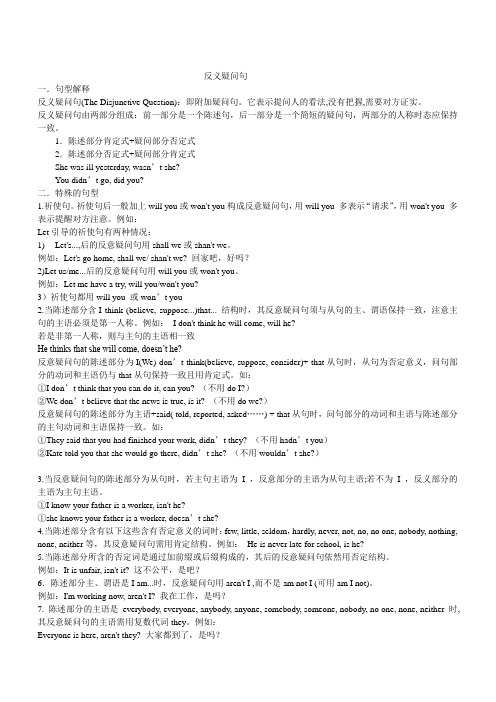
反义疑问句一.句型解释反义疑问句(The Disjunctive Question):即附加疑问句。
它表示提问人的看法,没有把握,需要对方证实。
反义疑问句由两部分组成:前一部分是一个陈述句,后一部分是一个简短的疑问句,两部分的人称时态应保持一致。
1.陈述部分肯定式+疑问部分否定式2.陈述部分否定式+疑问部分肯定式She was ill yesterday, wasn’t she?You didn’t go, did you?二.特殊的句型1.祈使句。
祈使句后一般加上will you或won't you构成反意疑问句,用will you 多表示“请求”,用won't you 多表示提醒对方注意。
例如:Let引导的祈使句有两种情况:1) Let's...,后的反意疑问句用shall we或shan't we。
例如:Let's go home, shall we/ shan't we? 回家吧,好吗?2)Let us/me...后的反意疑问句用will you或won't you。
例如:Let me have a try, will you/won't you?3)祈使句都用will you 或won’t you2.当陈述部分含I think (believe, suppose...)that... 结构时,其反意疑问句须与从句的主、谓语保持一致,注意主句的主语必须是第一人称。
例如:I don't think he will come, will he?若是非第一人称,则与主句的主语相一致He thinks that she will come, doesn’t he?反意疑问句的陈述部分为I(We) don’t think(believe, suppose, consider)+ that从句时,从句为否定意义,问句部分的动词和主语仍与that从句保持一致且用肯定式。
中考英语反义疑问句讲解及习题!
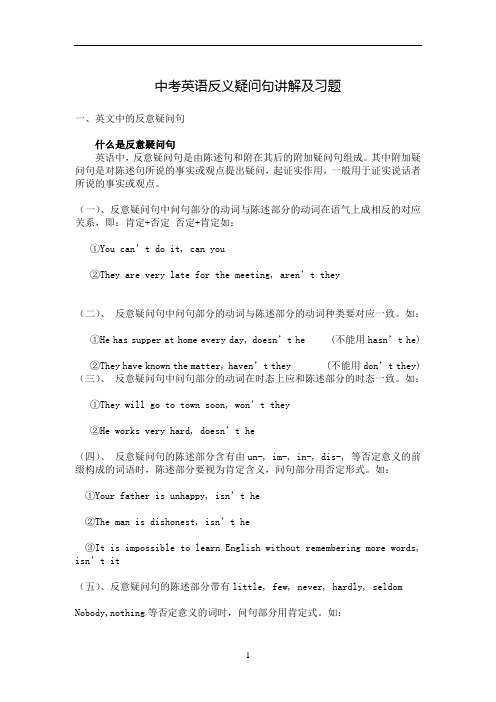
中考英语反义疑问句讲解及习题一、英文中的反意疑问句什么是反意疑问句英语中,反意疑问句是由陈述句和附在其后的附加疑问句组成。
其中附加疑问句是对陈述句所说的事实或观点提出疑问,起证实作用,一般用于证实说话者所说的事实或观点。
(一)、反意疑问句中问句部分的动词与陈述部分的动词在语气上成相反的对应关系,即:肯定+否定否定+肯定如:①You can’t do it, can you②They are very late for the meeting, aren’t th ey(二)、反意疑问句中问句部分的动词与陈述部分的动词种类要对应一致。
如:①He has supper at home every day, doesn’t he (不能用hasn’t he)②They have known the matter, haven’t they (不能用don’t they) (三)、反意疑问句中问句部分的动词在时态上应和陈述部分的时态一致。
如:①They will go to town soon, won’t they②He works very hard, doesn’t he(四)、反意疑问句的陈述部分含有由un-, im-, in-, dis-, 等否定意义的前缀构成的词语时,陈述部分要视为肯定含义,问句部分用否定形式。
如:①Your father is unhappy, isn’t he②The man is dishonest, isn’t he③It is impossible to learn English without remembering more words, isn’t it(五)、反意疑问句的陈述部分带有little, few, never, hardly, seldomNobody,nothing等否定意义的词时,问句部分用肯定式。
如:①She never tells a lie, does she (不用doesn’t she)②He was s eldom late, was he (不用wasn’t he)(六)、反意疑问句的陈述部分为I am……时,问句部分习惯上用aren’t I 表示。
反义疑问句讲解和练习(答案)

反义疑问句讲解和练习(答案)反意疑问句英语中的反意疑问句是由陈述句和附在其后的附加疑问句组成。
附加疑问句是对___所说的事实或观点提出疑问,起证实作用,一般用于证实说话者所说的事实或观点。
回答时,如果情况属实,用Yes加上反问句的倒装肯定句;若果情况不属实,则用No加上反问句的倒装否定句。
反意疑问句中问句部分的动词与陈述部分的动词在语气上成相反的对应关系,即:肯定+否定?否定+肯定?当陈述句中含有be动词,助动词,或是情态动词时,反问句部分由这些词加上主语人称代词构成。
例如:You can’t do it。
can you。
你不能做它,是吗?They are very late for the meeting。
___。
他们开会迟到了,是吗?She is a lovely girl。
isn’t she。
她是一个可爱的女孩,是吗?He will go home。
won’t he。
他要回家了,是吗?She doesn’t like to eat popcorn。
does she。
她不喜欢吃爆米花,是吗?The baby won’t sleep early。
will it。
小宝宝睡得不早,是吗?需要注意的是,当陈述句中含有have时,反问句部分不能用hasn’t he或don’t they,而应该用___。
例如:He has supper at home every day。
doesn’t he。
他每天在家吃晚饭,是吗?They have known the matter。
___。
他们已经知道那事情了,是吗?小试牛刀:It’s very hot today。
isn’t it?He can speak Chinese。
can’t he?It’s a good day for swimming。
isn’t it?Tom has been to Singapore。
hasn’t he?She doesn't like climbing hills。
反义疑问句详解及练习题(带答案)

反义疑问句的用法1.定义:反义疑问句,表示说话人提出看法、建议或意见,问对方同意与否。
2.结构:有两部分组成,前一部分为陈述形式,后一部分为疑问句。
3.形式:前肯后否与前否后肯。
Lucy isn't beautiful, is she?露西不漂亮,是吗?Li Ming is pretty handsome, isn't he?黎明相当帅,不是吗?4.回答:肯定回答:“Yes+肯定结构”,否定回答“No+否定结构”,但是注意“Yes”要译为“不”,“No”要译为“是”。
-Your sister is a teacher, isn't she?你妹妹是老师,不是吗?-Yes, she is.不,她是老师。
-You can play the guitar, can't you?你会弹吉他,不是吗?-No, I can't.是的,我不会。
特别注意:1)当陈述部分为否定式,反意疑问句为肯定式时,其回答往往与汉语不一致"It isn’t cheap, is it?" "Yes, it is."“它不便宜吧?”“不,很便宜。
”"He doesn’t love her, does he?" "No, he doesn’t."“他不爱她,是吗?”“是的,他不爱她。
”此时,"Yes"即不,对前面"It isn't cheap."的否定。
否定反意疑问句的回答当陈述部分为肯定式,反意疑问句为否定式时,其回答一般不会造成困难,一般只需照情况回答即可:"It’s new, isn’t it?" "Yes, it is."“是新的,对吗?”“对,是新的。
”"H e wants to go, doesn’t he?" "No, he doesn’t."“他想去,对吗?”“不,他不想去。
中考反义疑问句知识点习题带答案
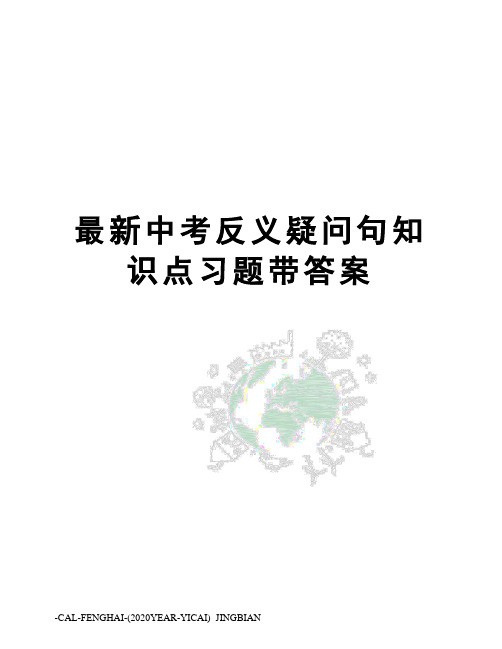
最新中考反义疑问句知识点习题带答案-CAL-FENGHAI-(2020YEAR-YICAI)_JINGBIAN反义疑问句【反义疑问句】(一)概念:反意疑问句是由陈述句和附在其后的附加疑问句组成。
其中附加疑问句是对陈述句所说的事实或观点提出疑问,起证实作用,一般用于证实说话者所说的事实或观点。
(二)要点注意:1、反意疑问句前后两部分谓语应是:“肯定陈述+否定疑问”或“否定陈述+肯定疑问”。
2、简略问句如果是否定式:not应与be,do,will等系动词、助动词、情态动词缩写。
3、简略问句的主语不用名词,应用人称代词。
4、陈述部分含“too...to”时,是否定句。
(三)用法:1) 陈述部分I am时,疑问部分要用 aren't I.I'm as tall as your sister,aren't I(我和你姐姐一样高,对吗)2) 陈述部分用 no, nothing, nobody, never, few, little, seldom, hardly等否定含义的词时,疑问部分用肯定含义。
如: The old man made no answer, did he?Jim is never late for school, is he?3) 陈述部分有情态动词have to +v. (had to + v.),疑问部分常用don't +主语(didn't +主语)。
We have to get there at eight tomorrow, don't we?used to,疑问部分用didn't +主语或 usedn't +主语。
He used to take pictures there, didn't he / usedn't hehad better(最好) + v. 疑问句部分用hadn't you?You'd better read it by yourself, hadn't you?4) 陈述部分有would rather(宁可、宁愿) +v.,疑问部分多用 wouldn't +主语。
初中反义疑问句详解及练习和答案
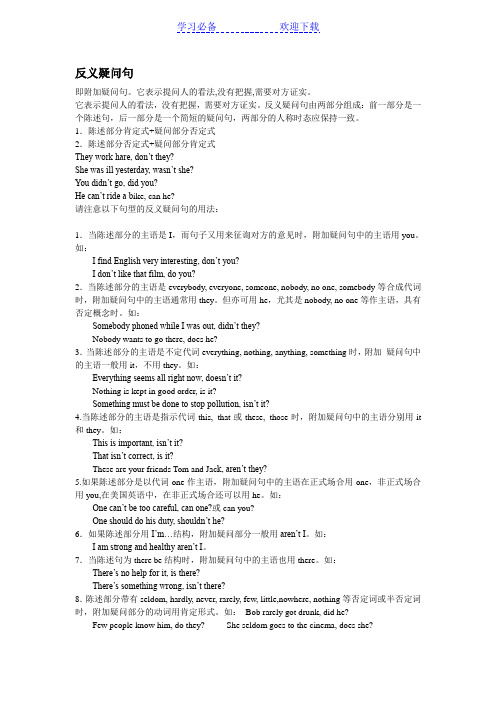
反义疑问句即附加疑问句。
它表示提问人的看法,没有把握,需要对方证实。
它表示提问人的看法,没有把握,需要对方证实。
反义疑问句由两部分组成:前一部分是一个陈述句,后一部分是一个简短的疑问句,两部分的人称时态应保持一致。
1.陈述部分肯定式+疑问部分否定式2.陈述部分否定式+疑问部分肯定式They work hare, don’t they?She was ill yesterday, wasn’t she?You didn’t go, did you?He can’t ride a b ike, can he?请注意以下句型的反义疑问句的用法:1.当陈述部分的主语是I,而句子又用来征询对方的意见时,附加疑问句中的主语用you。
如:I find English very interesting, don’t you?I don’t like that film, do you?2.当陈述部分的主语是everybody, everyone, someone, nobody, no one, somebody等合成代词时,附加疑问句中的主语通常用they。
但亦可用he,尤其是nobody, no one等作主语,具有否定概念时。
如:Somebody phoned while I was out, didn’t they?Nobody wants to go there, does he?3.当陈述部分的主语是不定代词everything, nothing, anything, something时,附加疑问句中的主语一般用it,不用they。
如:Everything seems all right now, doesn’t it?Nothing is kept in good order, is it?Something must be done to stop pollution, isn’t it?4.当陈述部分的主语是指示代词this, that或these, those时,附加疑问句中的主语分别用it 和they。
反义疑问句及中考题训练(含答案)

反义疑问句[反义疑问句]〔一〕概念:反意疑问句是由陈述句和附在其后的附加疑问句组成。
其中附加疑问句是对陈述句所说的事实或观点提出疑问,起证实作用,一般用于证实说话者所说的事实或观点。
〔二〕要点注意:1、反意疑问句前后两部分谓语应是:“肯定陈述+否定疑问〞或“否定陈述+肯定疑问〞。
2、简略问句如果是否定式:not应与be,do,will等系动词、助动词、情态动词缩写。
3、简略问句的主语不用名词,应用人称代词。
4、陈述部分含“too...to〞时,是否定句。
〔三〕用法:1) 陈述部分I am时,疑问部分要用aren't I.I'm as tall as your sister,aren't I?〔我和你姐姐一样高,对吗?〕2) 陈述部分用no, nothing, nobody, never, few, little, seldom, hardly等否定含义的词时,疑问部分用肯定含义。
如:The old man made no answer, did he?Jim is never late for school, is he?3) 陈述部分有情态动词have to +v. (had to + v.),疑问部分常用don't +主语〔didn't +主语〕。
We have to get there at eight tomorrow, don't we?used to,疑问部分用didn't +主语或usedn't +主语。
He used to take pictures there, didn't he? / usedn't he?had better〔最好〕+ v. 疑问句部分用hadn't you?You'd better read it by yourself, hadn't you?4) 陈述部分有would rather〔宁可、宁愿〕+v.,疑问部分多用wouldn't +主语。
反义疑问句及中考题训练(含答案)
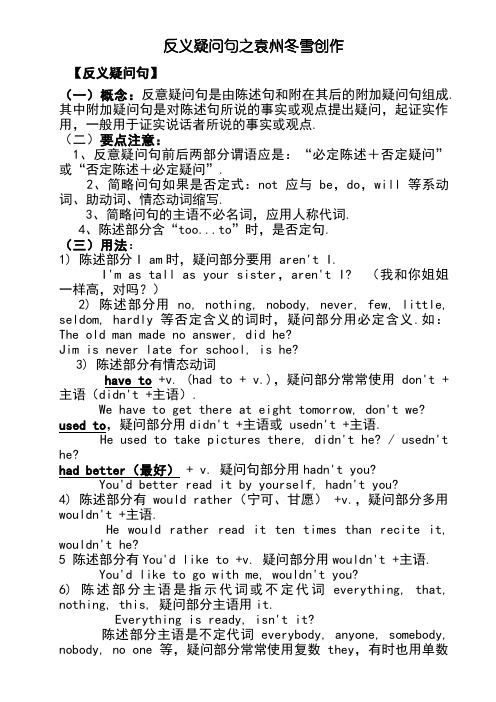
反义疑问句之袁州冬雪创作【反义疑问句】(一)概念:反意疑问句是由陈述句和附在其后的附加疑问句组成.其中附加疑问句是对陈述句所说的事实或观点提出疑问,起证实作用,一般用于证实说话者所说的事实或观点.(二)要点注意:1、反意疑问句前后两部分谓语应是:“必定陈述+否定疑问”或“否定陈述+必定疑问”.2、简略问句如果是否定式:not应与be,do,will等系动词、助动词、情态动词缩写.3、简略问句的主语不必名词,应用人称代词.4、陈述部分含“too...to”时,是否定句.(三)用法:1) 陈述部分I am时,疑问部分要用 aren't I.I'm as tall as your sister,aren't I? (我和你姐姐一样高,对吗?)2) 陈述部分用 no, nothing, nobody, never, few, little, seldom, hardly等否定含义的词时,疑问部分用必定含义.如:The old man made no answer, did he?Jim is never late for school, is he?3) 陈述部分有情态动词have to +v. (had to + v.),疑问部分常常使用don't +主语(didn't +主语).We have to get there at eight tomorrow, don't we? used to,疑问部分用didn't +主语或 usedn't +主语.He used to take pictures there, didn't he? / usedn't he?had better(最好) + v. 疑问句部分用hadn't you?You'd better read it by yourself, hadn't you?4) 陈述部分有would rather(宁可、甘愿) +v.,疑问部分多用wouldn't +主语.He would rather read it ten times than recite it, wouldn't he?5 陈述部分有You'd like to +v. 疑问部分用wouldn't +主语.You'd like to go with me, wouldn't you?6) 陈述部分主语是指示代词或不定代词everything, that, nothing, this, 疑问部分主语用it.Everything is ready, isn't it?陈述部分主语是不定代词everybody, anyone, somebody, nobody, no one等,疑问部分常常使用复数they,有时也用单数he.Everyone knows the answer, don't they? (doesn’t he?)Nobody knows about it, do they? (does he?)7) think引导的宾语从句:I don't think he is bright, is he?We believe she can do it better, can't she?B. 如果主语不是第一人称则疑问部分与主句相对应构成反意疑问句He thought they were wrong, didn't he? (不克不及说weren't they?)8) 省去主语的祈使句的反意疑问句,疑问部分用will you.Don't do that again, will you??Let's go and listen to the music, shall we(或用shan't we)?Let us wait for you in the reading-room, will you (或won't you)?9) 陈述部分是"there be"布局的,疑问部分用there.There is something wrong with your watch, isn't there?There will not be any trouble, will there?10) 否定前缀不克不及视为否定词,其反意疑问句仍用否定形式.It is impossible, isn't it? He is not unkind to his classmates, is he?反义疑问句由两部分组成:前一部分是一个陈述句,后一部分是一个简短的疑问句,两部分的人称时态应坚持一致.主语一般词语附加疑问句中主语用和主语一致的主语,用主格.不定代词当陈述部分的主语是(1)everyone,no one, nobody 等时,后面的疑问句应暗示为:Everyone is in the classroom, aren't they? (基本不必单数,但也可用he)Nobody will go, will they?(2)everything,anything,nothing,something时,附加疑问句中主语一般用 it 不必 they(3)this,that,或those,these时,附加疑问句中主语用it和they.特殊句型(1)当陈述部分有never,seldom, hardly,few,little,barely, scarcely, nothing 等否定意义的词时,后面的反意疑问句则为必定形式:There are few apples in the basket, are there?He can hardly swim, can he?They seldom come late, do they?(2)当陈述部分含有否定意思的词是unhappy,dislike,unfriendly等含有否定词缀的派生词,也就是有un-前缀、-less后缀等含有词缀而意思否定的词,当做必定句处理,疑问部分要用否定形式.如:He looks unhappy,doesn't he?他看上去不高兴,不是吗?The girl dislikes history,doesn't she?这女孩不喜欢汗青,不是吗?含有think, believe, suppose, imagine, expect等动词后接宾语从句构成的主从复合句在构成反意疑问句时,视情况分歧有两种分歧的构成方式.(1)当主句的主语为第一人称时,其后的简短问句应与从句相一致.例如:I expect our English teacher will be back this weekend, won't she/he?We suppose you have finished the project, haven't you?值得注意的是,当这些动词后接的宾语从句的否定转移到主句时,其仍属否定句,故其后的简短问句应用必定式,而非否定式.例如:I don't believe that he can translate this book, can he? Wedon't imagine the twins have arrived, have they?此类句子的回答同"前否后肯"型反意疑问句一样,如上述后一个句子,若双胞胎已经到了,则回答为"Yes, they have.";若尚未到达,使用"No, they haven't.".(2)当主句的主语为第二、三人称时,其后的简短问句则应与主句相一致(此时,否定只看主句,与从句无关...).例如:Your sister supposes she needs no help, doesn't she?You thought they could have completed the project, didn't you?They don't believe she's an engineer, do they?She doesn't expect that we are coming so soon, does she? (3)但如果主句的时态是过去时等等,疑问句应和主句的人称时态坚持一致.陈述部分有had better,或其中的have暗示完成时态时,疑问句应用hadn’t等开首:You’d better get up early, hadn’t you?其他情况句中有have时疑问句应用don't等开首如have暗示“有”的时候,有两种形式:-He has two sisters,doesn't he?-He doesn't have any sisters,does he?当陈述部分是祈使句时,疑问句要根据语气来表达当开首是Let‘s时,一定要用shall we.其余都用will you(包含 Let us)不管必定否定Let’s go out for a walk, shall we?Let us go out for a walk, will you?Let me help you,may I?Turn on the radio, will you?There be 句型中,反义疑问部分必须为be 动词 + thereThere are some apples in the basket, aren't there?There isn't any milk left, is there?当陈述部分有情态动词must,问句有4种情况:(1)mustn't暗示“制止,不成,不必”时,附加问句通常要用must.You mustn't stop your car here,must you? 你不克不及把车停在这地方,知道吗?(2)must暗示“有需要”时,附加问句通常要用needn't.They must finish the work today,needn't they? 他们明天要完成这项工作,是吗?(3)当must用来暗示对现在的情况停止推测时,问句通常要根据must后面的动词采取相应的形式.He must be good at English,isn't he? 他英语一定学得很好,是吗?(4)当must+have done暗示对过去的情况停止推测(一般句中有明白的过去时间状语),问句要根据陈述部分谓语的情况用“didn't+主语”或“wasn't/weren't+主语”;如果强调动作的完成(一般没有明白的过去时间状语),问句要用“haven't/hasn't+主语”.She must have read the novel last week,didn't she? 她上星期一定读了这本小说,是吗?You must have told her about it,haven't you? 你一定把这事告诉她了,是吗?回答反意疑问句的回答用yes, no,但是,回答意思相反,当陈述部分是否定形式时,回答要按事实.如:They don’t work hard, do they? 他们不太尽力工作,是吗?Yes, they do. 不,他们工作尽力./No, they don’t. 对,他们工作不尽力当陈述部分为否定式,反意疑问句为必定式时,其回答往往与汉语纷歧致,需特别引起注意:"It isn’t cheap, is it?" "Yes, it is." “它不便宜吧?”“不,很便宜.”"He doesn’t love her, does he?" "No, he doesn’t."“他不爱她,是吗?”“是的,他不爱她.”此时,"Yes"即不,对前面"It isn't cheap."的否定.当陈述部分为必定式,反意疑问句为否定式时,其回答一般不会造成坚苦,一般只需照情况回答即可:"It’s new, isn’t it?" "Yes, it is." “是新的,对吗?”“对,是新的.”"He wants to go, doesn’t he?" "No, he doesn’t." “他想去,对吗?”“不,他不想去.”此时,"No"即是,对前面"It's new."的必定.回答反意疑问句通常应根据实际情况来确定,“It is a beautiful flower,isn't it?” “It isn't a beautiful flower,is it?”必定均为“Yes,it is."否定为“No,it isn't."疾速记忆表Wishmay +主语no,nothing,nobody,never,few, seldom, hardly,必定含义rarely, little等否定含义的词ought to(必定的)shouldn't/ oughtn't +主语have to+v.(had to+v.)don't +主语(didn't +主语)used todidn't +主语或 usedn't +主语had better + v.hadn't youwould rather + v.wouldn't +主语you'd like to + v.wouldn't +主语must根据实际情况而定感叹句中be +主语Neither…nor, either…or 毗连的并列主语根据其实际逻辑意义而定指示代词或不定代词 everything,that,nothing,this主语用it并列复合句谓语根据临近从句的谓语而定定语从句,宾语从句的主从复合句根据主句的谓语而定think,believe,expect, suppose,imagine等引导与宾语从句相对应的从句everybody,anyone, somebody,nobody,no one复数they, 单数he 情态动词dare或needneed (dare ) +主语dare, need 为实义动词do +主语省去主语的祈使句will you?Let's 开首的祈使句Shall we?Let us 开首的祈使句Will you?there be相应的谓语动词+there(省略主语代词)否定前缀不克不及视为否定词仍用否定形式must表"推测根据其推测的情况来确定反意疑问句1. Linda ate nothing this morning, ___? A. didn’t she B. w as she C. did she D. wasn’t she2. There’s hardly___ milk in the bottle, _____there? A. no, isn’t B. some, is C. little, isn’t D. any, is3. He has never ridden a horse before, ___? A. does he B. has he C. hasn’t he D. doesn’t he4. — He seldom came here, _____? — Yes sir.A. didn’t heB. does heC. doesn’t heD. did he 5. Everything seems all right, _____ ? A. does it B. don’t they C. won’t it D. doesn’t it 7. One can’t be too modest, can _____ ? A. one B. he C. it D. we 8. No one failed in the exam, _____ ? A. was he B. did one C. did they D. didn’t he 10. Neither you nor I am a artist,_____ ? A. am I B. aren’t we C. are we D. a m n’t I 11. He can’t be her father, _____ he? A. is B. isn’t C. can D. can’t 12. They have no time to visit the museum, _____? A. do they B. haven’t they C. don’t they D. will they 14. You’d better go at once, _____ you? A. hadn’t B. did C. didn’t D. don’t 15. You’d rather work than play, _____ you? A. hadn’t B. wouldn’t C. didn’t D. mustn’t 16. You dare not do that, _____ you? A. do n’t B. do C. dare D. daren’t 18. He dislikes the two subjects, _____ he? A. does B. doesn’t C. is D. isn’t 19. These tools are useless now, _____ ? A. are they B. aren’t they C. is it D. isn’t it 20. He used to get up at 6:30, _____ he? A. didn’t he B. did he C. used he D. wouldn’t he 22. He ought to win the first prize, _______ he? A. mustn’t B. oughtn’t C. shouldn’t D. Both B and C. 23. Let’s go there by bus, ___? A. will you B. shall we C. don’t you D. will you 24. Let us go to play football, ___? A. will you B. shall we C. do we D. are we 25. Don’t forget to give Polly some food and change her water, ___? A. will you B. shall we C. won’t you D. do you 26. —Let’s go shopping this afternoon, _____? — All right. A. will we B. shallwe C. don’t we D. are we 27. — Pass me the dictionary, _____? — Yes, with pleasure. A. would you B. will you C. won’t you D. wouldn’t you 30. There is little water in the glass, ____? A. isn’t there B. isn’t it C. is it D. is there 32. There won’t be any concert this Saturday evening, _____ ? A. will there not B. will there C. is there D. won’t 33. — I guess she taught herself Japanese, ______? —Yes. A. don’t I B. did she C. do I D. didn’t she 34. I don’t believe you are right, _____ ? A. are you B. do you C. won’t you D. do 35. She doesn’t think that Tom sings best in the class, _____ ? A. does she B. doesn’t she C. does he D. doesn’t he 37. I know you didn’t want to hurt me, _____ ? A. did you B. didn’t you C. do I D. don’t I 38. If my father were here he would be very happy, _____ ? A. weren’t he B. were he C. wouldn’t he D. would heKey: 1—5 CDBDD 6—10 BACDC 11—15 AABAB 16—20 CCBBA 21—25CDBAA 26—30 BBBAD 31—35 BBDAA 36—38 AAC British newspapers are much smaller than they used to be and their readers are often in a hurry ,so newspapermenwrite as few words as possible .They tell their readers at once what happened ,where ,when and how it happened and what was the result : how many people were killed ,what change was done and so on .Readers want the fact(事实) set out as fully and accurately as possible .Readers are also interested in the people who have seen the accident. So a newspaperman always likes to get some information (信息)from someone who was there, which can be given in the person’s own words .Because he can use only a fewwords ,the newspaperman must choose those wordscarefully ,every one must be effective(有效). Instead of “he called out in a loud voice”, he writes” he shouted”; instead of “the loose stones rolled noisily down the side of the mountain”, he will write” they thundered down the mountainside”. Because many of the readers aren’t very clever, and most of them are in a hurry.1.From the text, we learn that newspapermen write as fewwords as possible ,becausereaders___.A. want to know more about the newsB.take no interest in what has happenedC.have no time to read the news carefullyD.pay much attention to the result2.The underlined word”one”3.Which of the following would best complete the text ?A. he will keep his writing shortB. he won’t care about his writingC. he will give nothing but informationD. he won’t make his writing good enough.4.In what way do you think British newspapers have becomesmaller?A. In a page size.B. In number of readers.C. In number of pages.D. In number of copies5.Which of the following is true?A. Readers are not satisfied with the short news.B. Not many people have time to read the long articles in newspapers.C. Readers find the language of the newspapers exciting.D. Newspapermen try to report as fully as possible.CABABIt was getting dark. Some children and two Canadian women were still________on the ice near a big hotel. They werehaving a good time.Suddenly the ice_________. One of the boys fell into the water. The children shouted, “Help! Help!”They didn’t know_________to do. The two Canadian friends heard__________and skated over to get the boy out of the water.The ice was__________. The two Canadians fell into the water, too. But they tried their best to_________the little boy. They knew they must be_________. If they didn’t push him up onto the ice, he would soon die.Many people ran over to_________. Some of them had ropes and poles(绳和竹竿). A young man jumped into the water to wave the_________people.The boy and the two Canadian women were out of water at last. One of the women didn’t feel well. She was sent to the_________at once. But she felt very happy because the boy was safe.top around higher thinking foreign different even walking look pleasure。
初中英语反义疑问句讲解练习及答案

反义疑问句一、考点、热点回忆【词汇辨析】1.,及"也",表示肯定意义,及肯定的表达方法连用;"也不",表示否认意义,及否认的表达方法连用。
〔1〕—.我哥哥喜欢踢足球。
—I , .我也是〔喜欢〕。
〔2〕—'t .我哥哥不喜欢踢足球。
—I 't, .我也不喜欢。
也可以表示"也",但一般情况下放在动词之前。
如:.我们也喜欢访谈节目。
2. 和后接不可数名词,用来表示数量太多,意思是“……太多了〔数量多〕〞后接形容词,用来说明程度的,意思是“太……〔程度深〕〞如:太多水〔表数量〕太重了〔表程度〕【固定搭配】 + . + 介词动词+ 名词/ 代词/ 副词+ 介词赶上 .找到;提出(答案、解决方法等) a .及......相处融洽 ?生(孩子) ./ 自取;随便吃 , .【反义疑问句】〔一〕概念:反意疑问句是由陈述句和附在其后的附加疑问句组成。
其中附加疑问句是对陈述句所说的事实或观点提出疑问,起证实作用,一般用于证实说话者所说的事实或观点。
〔二〕要点注意:1、反意疑问句前后两局部谓语应是:“肯定陈述+否认疑问〞或“否认陈述+肯定疑问〞。
2、简单问句如果是否认式:应及,,等系动词、助动词、情态动词缩写。
3、简单问句的主语不用名词,应用人称代词。
4、陈述局部含“〞时,是否认句。
〔三〕用法:1) 陈述局部I 时,疑问局部要用 't I.I'm ,'t I? 〔我和你姐姐一样高,对吗?〕2) 陈述局部用 , , , , , , , 等否认含义的词时,疑问局部用肯定含义。
如: , ?, ?3) 陈述局部有 . ( + v.),疑问局部常用't +主语〔't +主语〕。
, 't ?4) 陈述局部的谓语是时,疑问局部用't +主语或 't +主语。
, 't ? / 't ?5) 陈述局部有〔最好〕 + v. 疑问句局部用't ?'d , 't ?6) 陈述局部有〔宁可、宁愿〕 .,疑问局部多用 't +主语。
- 1、下载文档前请自行甄别文档内容的完整性,平台不提供额外的编辑、内容补充、找答案等附加服务。
- 2、"仅部分预览"的文档,不可在线预览部分如存在完整性等问题,可反馈申请退款(可完整预览的文档不适用该条件!)。
- 3、如文档侵犯您的权益,请联系客服反馈,我们会尽快为您处理(人工客服工作时间:9:00-18:30)。
反义疑问句【反义疑问句】(一)概念:反意疑问句是由陈述句和附在其后的附加疑问句组成。
其中附加疑问句是对陈述句所说的事实或观点提出疑问,起证实作用,一般用于证实说话者所说的事实或观点。
(二)要点注意:1、反意疑问句前后两部分谓语应是:“肯定陈述+否定疑问”或“否定陈述+肯定疑问”。
2、简略问句如果是否定式:not应与be,do,will等系动词、助动词、情态动词缩写。
3、简略问句的主语不用名词,应用人称代词。
4、陈述部分含“too...to”时,是否定句。
(三)用法:1) 陈述部分I am时,疑问部分要用aren't I.I'm as tall as your sister,aren't I?(我和你姐姐一样高,对吗?)2) 陈述部分用no, nothing, nobody, never, few, little, seldom, hardly等否定含义的词时,疑问部分用肯定含义。
如:The old man made no answer, did he?Jim is never late for school, is he?3) 陈述部分有情态动词have to +v. (had to + v.),疑问部分常用don't +主语(didn't +主语)。
We have to get there at eight tomorrow, don't we?used to,疑问部分用didn't +主语或usedn't +主语。
He used to take pictures there, didn't he? / usedn't he?had better(最好)+ v. 疑问句部分用hadn't you?Y ou'd better read it by yourself, hadn't you?4) 陈述部分有would rather(宁可、宁愿)+v.,疑问部分多用wouldn't +主语。
He would rather read it ten times than recite it, wouldn't he?5 陈述部分有Y ou'd like to +v. 疑问部分用wouldn't +主语。
Y ou'd like to go with me, wouldn't you?6) 陈述部分主语是指示代词或不定代词everything, that, nothing, this, 疑问部分主语用it。
Everything is ready, isn't it?陈述部分主语是不定代词everybody, anyone, somebody, nobody, no one等,疑问部分常用复数they,有时也用单数he.Everyone knows the answer, don't they? (doesn’t he?)Nobody knows about it, do they? (does he?)7) think引导的宾语从句:A.主语是第一人称I don't think he is bright, is he?We believe she can do it better, can't she?B. 如果主语不是第一人称则疑问部分与主句相对应构成反意疑问句He thought they were wrong, didn't he? (不能说weren't they?)8) 省去主语的祈使句的反意疑问句,疑问部分用will you。
Don't do that again, will you?Go with me, will you / won't you?而Let us 开头的祈使句,后用will you(或won't you)?Let's go and listen to the music, shall we(或用shan't we)?Let us wait for you in the reading-room, will you (或won't you)?9) 陈述部分是"there be"结构的,疑问部分用there。
There is something wrong with your watch, isn't there?There will not be any trouble, will there?10) 否定前缀不能视为否定词,其反意疑问句仍用否定形式。
It is impossible, isn't it? He is not unkind to his classmates, is he?完成下列反意疑问句。
1.It’s very hot today, _______________ ?2. He can speak Chinese, _______________ ?3. Meimei studies in a middle school, _______________ ?4. He never gets up late , _______________ ?5. Don’t go out at night, _______________ ?6.He never loves cold weather , _______________ ?7. Y ou finished the task yesterday, _______________ ?8.It _______________ a good day for swimming, is it?9.T om has been to Singapore , _______________ ?10.The story is little interesting, _______________ ?11.Everything starts to grow in spring, _______________ ?12.He can hardly finish his homework, _______________ ?13.I’m in Class 3,Grade 2, _______________ ?14.Let’s go shopping , _______________ ?15.She doesn’t like climbing hills , _______________ ?16.I don’t think it is cold today, _______________ ?17. Y ou think he is a good flight attendant, _______________ ?18.Nobody knows where she lives, _______________ ?19.Few students can answer the question, _______________ ?20.Mike likes English, _______________ ?21.That was a wonderful night, _______________ ?22.Y our sister helped him, _______________ ?23.T om is skating, _______________ ?24.Y ou aren’t a teacher, _______________ ?25.They haven’t been to the Great Wall, _______________ ?26.Y ou will join the soccer team, _______________ ?27.He likes neither apples nor pears, _______________ ?28.There are some good books foryou, _______________ ?29.They have been there twice, _______________ ?30.Let’s do it now, _______________ ?31.Y ou dislike this kind of gifts, _______________ ?32.Nothing is impossible, _______________ ?33.Everything is possible, _______________ ?34.He doesn’t go to school by bus, _______________ ?35.There is little milk left in the bottle, _______________ ?36.Let us clean the classroom by ourselves, _______________ ?37.He has studied here for about four years, _______________ ?38.Y ou have never lost money before, _______________ ?39.Few of them hurt themselves in the accident last night, _______________ ?40.Peter could hardly see the words on the blackboard, _______________ ?41.She’s American, _______________ ?42.There will be a volleyball match in our school, _______________ ?43.Don’t smoke in the reading-room, _______________ ?44.I don’t think he is right, _______________ ?45.Y ou must do your homework by yourself, _______________ ?46.Y ou mustn’t touch the machine, _______________ ?47.He must be a worker, _______________ ?48.Someone looked for me yesterday, _______________ ?49.I’m a teacher, _______________ ?50.What a nice watch, _______________ ?51.I wish to use your ruler, _______________ ?52.I have to stay at home, _______________ ?53.Y ou’d better wear warm clothes today, _______________ ?54.What he needs is his parents’love, _______________ ?55.Y ou’d like a cup of tea, _______________ ?56.Don’t be late again, _______________ ?57.Their prices are really low, _______________ ?58.Reading is good for you to learn English, _______________ ?59.No one knows about it, _______________ ?60.I think you should study hard, _______________ ? 附加答案:1 . isn’t it 2. can’t he 3.do esn’t she 4.does he 5.will you6. does he7.didn’t you8. isn’t9.hasn’t he10.is it11.doesn’t it12.can he 13 .aren’t I 14.shall we 15.does she16.is it 17.don’t you18does it 19. can they 20.doesn’t he21.wasn’t it 22.didn’t she 23.isn’t he 24.are you 25.have they26.wont you 27.does he 28.aren’t there 29.haven’t they 30.shall we31.don’t you 32.is it 33.isn’t it 34.does he 35.is there36.will you 37.hasn’t he 38.have you 39.did they 40.could he41.isn’t she 42.won’t there 43.will you 44.is he 45.mustn’t you46.must you 47.isn’t he 48.didn’t they 49.aren’t I 50.isn’t it51.may I 52.don’t I 53.hadn’t you 54.isn’t it 55.wouldn’t you 56.will you 57.aren’t they 58.isn’t it 59.do they 60.shouldn’t you。
